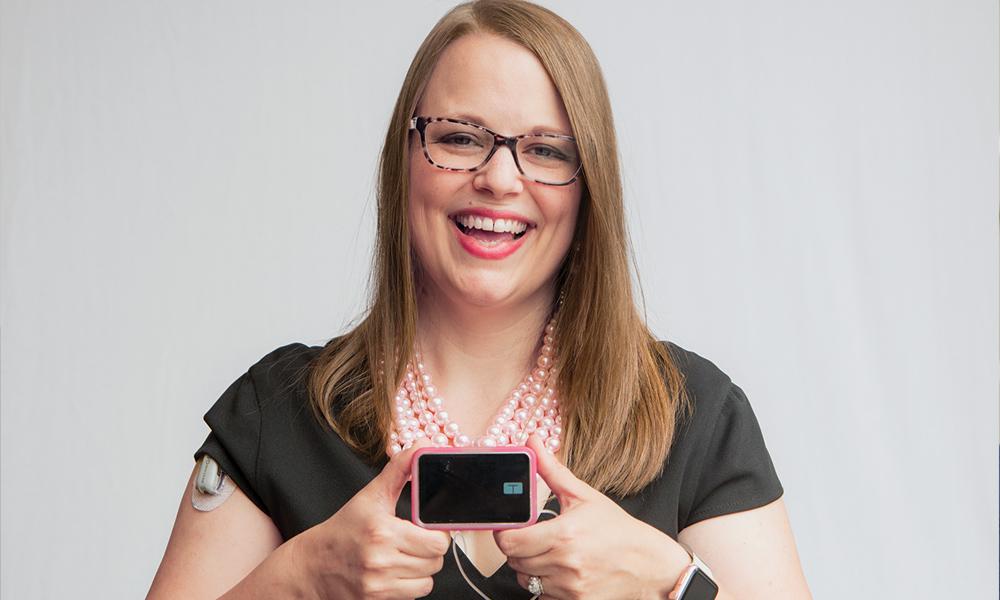Building outside the box
Health and Behavior
SUMMARY: Molly McElwee-Malloy ('00, '02M) uses her music degree every day in her work with health care professionals, advocacy groups and insurance companies to help people with diabetes.
By Sarah Chase (’17), alumni relations coordinator
Molly McElwee-Malloy (’00, ’02M) is a registered nurse and certified diabetes educator working with the behavioral science team on post-market clinical outcomes at Tandem Diabetes Care, a medical device manufacturer. In 2000, she graduated from JMU with a bachelor’s degree in music, and again in 2002 with a master’s in music. While not seemingly scientific, McElwee-Malloy says she uses her major every day.
During her sophomore year at JMU, McElwee-Malloy decided to see a doctor after experiencing unexplained weight loss and feelings of sickness and exhaustion. She was misdiagnosed with Type 2 diabetes. McElwee-Malloy finished the semester but, over break, continued to decline and was admitted to the hospital, where she was diagnosed with Type 1 diabetes. “There, I received insulin for the first time and felt like a completely new person. I realized this was the answer for my body.”
After sustaining an injury from overplaying the flute, she ceased competitive music performance after graduation, as the injury required surgery to continue. Instead, McElwee-Malloy pursued work within diverse industries, learning administrative and management skills. Over the years, she sought out many different doctors and therapies, but she found there were too many overwhelming variables with diabetes.
“It’s like walking around all day with a portable stove and a pot of water. You need to keep the water at simmer all the time, constantly adjusting the temperature up or down—but you also need to be a person, an employee, a functional human being.” While controllable, diabetes ran McElwee-Malloy’s life because she constantly had to manage her condition.
“The polish that JMU put on me ... is something that I do in my job all the time.”
In 2005, she heard about an artificial pancreas trial going on at the University of Virginia and decided to participate. “It was a continuous glucose monitor that would communicate my blood sugar level, and this insulin pump would act on a smart algorithm to help regulate itself rather than me have to worry about it.” It was revolutionary, and McElwee-Malloy wanted to be a part of the research. So, she asked doctors running the trials what it would take to be on their team.
The doctors chuckled but answered honestly that they could use a nurse.
Two years later, after returning to school and becoming a registered nurse, McElwee-Malloy joined the team at U.Va. working on the very trials she had been participating in. The team would become the Center for Diabetes Technology at U.Va. under the direction of Dr. Boris Kovatchev, sometimes known as the father of the artificial pancreas.
Kovatchev’s team helped to create and refine an accurate algorithm prediction. “Essentially, it’s weather forecasting for the insulin and glucose in your body,” McElwee-Malloy said. After successful trials and a startup acquisition, the algorithms were licensed to be commercialized and integrated into an insulin pump made by Tandem Diabetes Care. McElwee-Malloy stayed with the product throughout the entire process.
She officially joined the Tandem team in January 2018 after the algorithms were licensed and is approaching her 10th year of working on smart diabetes technology. As of today, Control-IQ Technology has been submitted to the Food and Drug Administration for approval of treatment for insulin-dependent diabetes.
McElwee-Malloy was drawn to Tandem because of its tenacity and how it addresses accessibility to those who need it. That’s why she now focuses on post-market outcomes, working with advocacy groups, health care professionals and insurance providers to ensure that those with diabetes are eligible for the device. It is here that McElwee-Malloy says she uses her JMU degrees every day.
“The polish that JMU put on me, particularly my flute professor, Carol Kniebusch Noe, to be able to perform, to translate a difficult piece of music to an audience, is something that I do in my job all the time.” She likens complex music to the complicated technicality of the science field. “Working in diabetes, particularly medical device technology, is very technical—and every day I’m taking that complicated ‘music,’ if you will, to health care professionals, advocacy groups and insurance companies for them to hear, understand and be affected by.”
In the future, she hopes to continue her work in improving the product and creating updated versions. “For a long time, I didn’t know what I was supposed to be doing, but this is it,” she said. “If I could tell students anything, it would be to build your skill set and not to be afraid of building outside of your box with something that might not make sense right now.”
# # #

